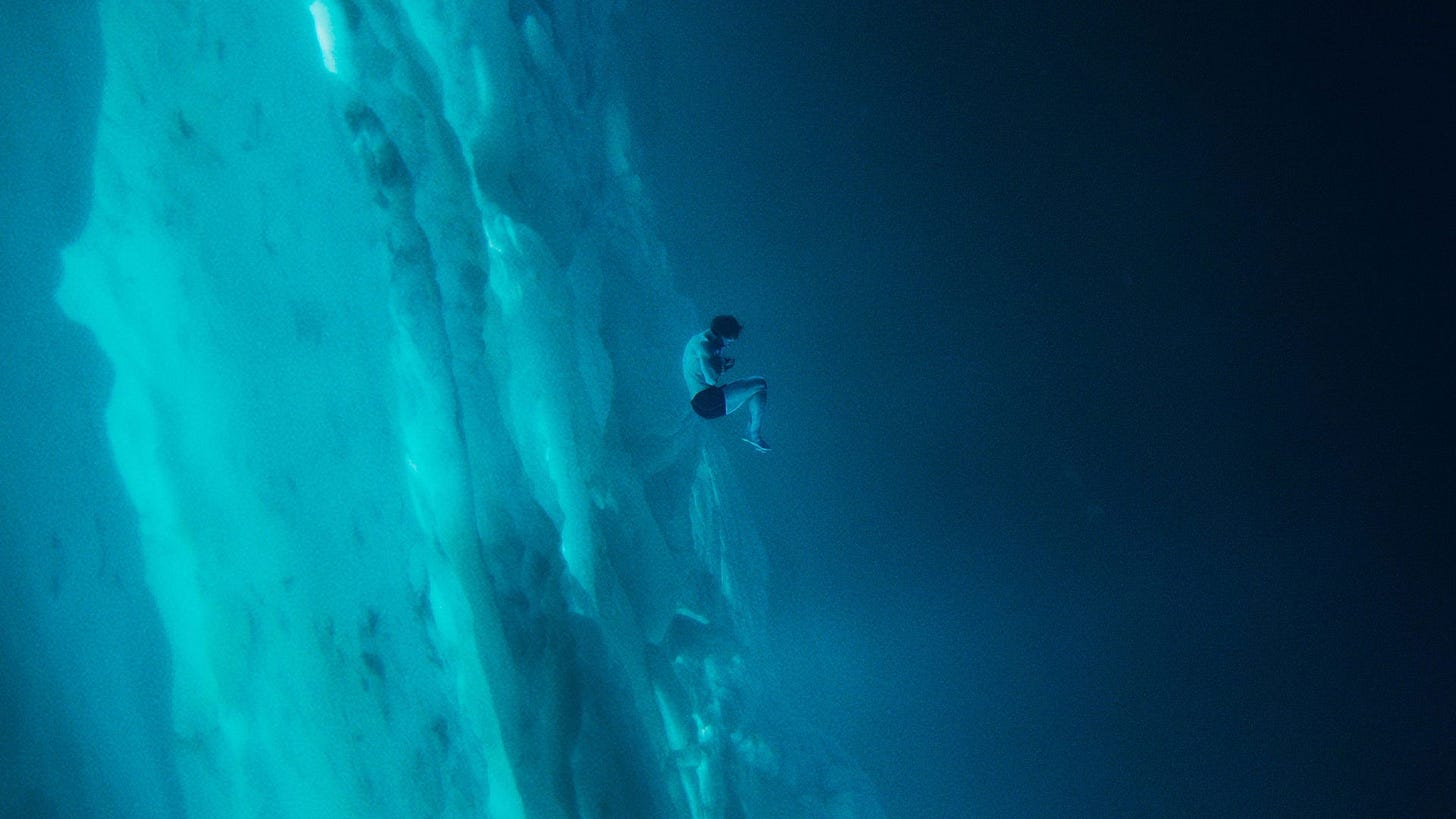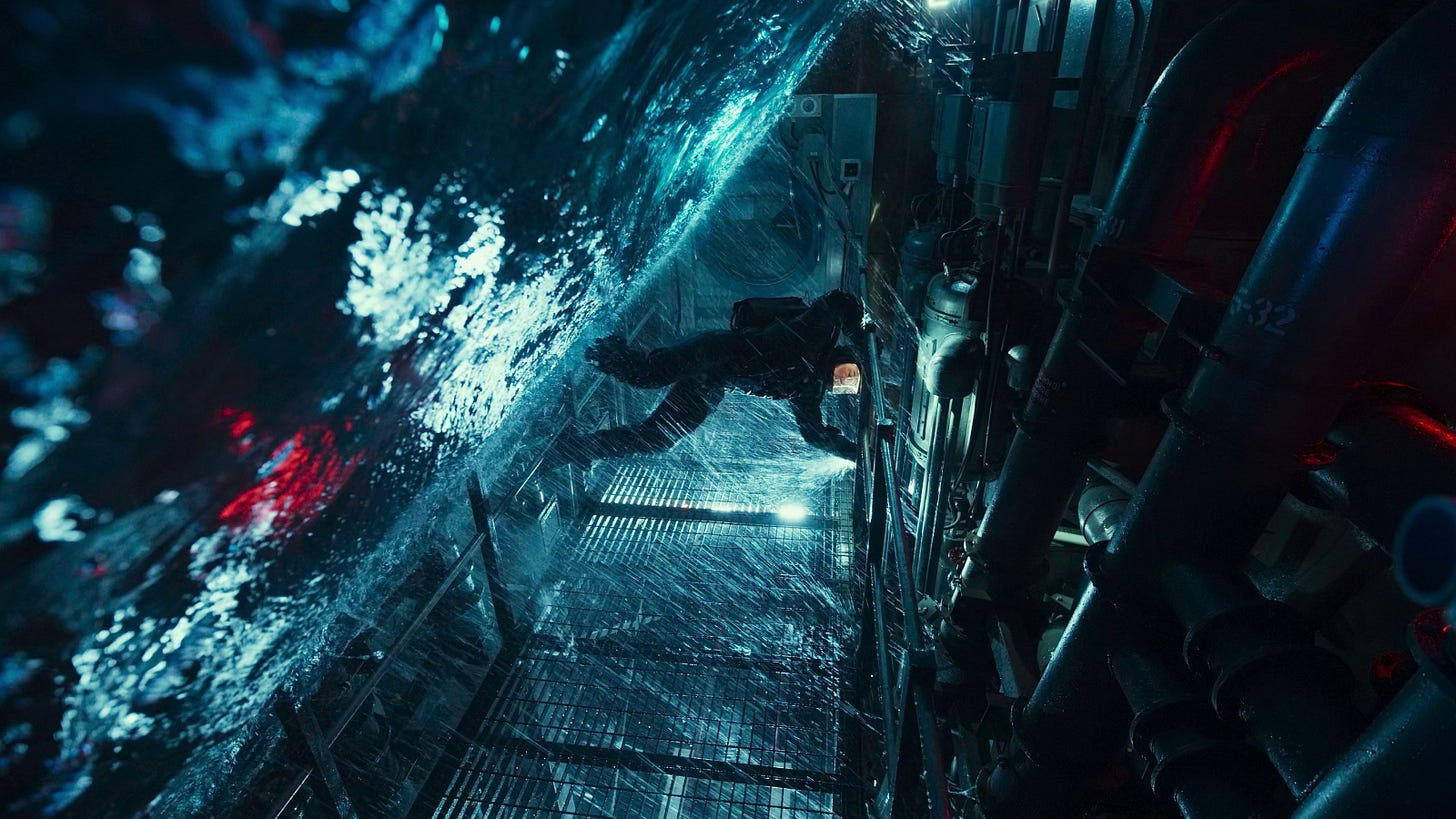Se o anti-Deus é a inteligência artificial, então Ethan Hunt é um messias com a missão de se sacrificar física, emocionalmente e, talvez, fatalmente para salvar a humanidade. É uma leitura imediata considerados os acontecimentos narrados em O Acerto Final, o oitavo e último (?) capítulo da série de filmes iniciada em 1996, a continuação direta de Acerto de Contas - Parte 1, mesmo tendo aberto mão da Parte 2 por razões comerciais (o filme anterior não alcançou o êxito esperado). Ethan, ao lado dos agentes renegados da IMF e de adições iniciadas no episódio passado, deve encontrar uma forma de impedir que A Entidade, o nome dado à inteligência artificial, cause uma catástrofe que varrerá a humanidade do mundo. Para isso, Ethan deve convencer a Presidente Estadunidense (Angela Bassett) a lhe proporcionar os meios necessários para rastrear um submarino onde se encontra a versão original do código fonte d’A Entidade, indispensável para a aplicação da Pílula criada por Luther (Ving Rhames), um vírus que altera a realidade da inteligência artificial, enquanto rastreia Gabriel (Esai Morales), que pretende utilizá-la para reconstruir a ordem mundial.
Não consigo considerar o roteiro escrito por Christopher McQuarrie e Erik Jendresen senão como desculpa para que a ação desenvolva-se, e não me refiro somente à missão contida na sinopse, mas aos momentos em que a equipe está reunida para planejar as ações seguintes. Você simplesmente aceita que as coisas acontecem daquela maneira e que os heróis precisam desplugar um certo dispositivo em um piscar de olhos, ou então tem só 10 segundos para correr de lá para cá, ou que uma tecnologia confidencial dá a Ethan a capacidade de sobreviver à despressurização em uma profundidade mortal. O Acerto Final não convida a gente a entender de imediato o que a turma está decidindo, mas a aproveitar a adrenalina resultante de por o plano em movimento. O roteiro é, de certo modo, uma caixa preta, que nos dá acesso ao suficiente: os (sub)temas discutidos. A tecnofobia caracterizada pela evolução exponencial e descontrolada da tecnologia é relacionada à ansiedade apocalíptica de um conflito nuclear, quando A Entidade torna-se capaz de acessar o arsenal das potências nucleares (“naturalmente”, a dos Estados Unidos é a melhor protegida) fazendo com que as armas por nós criadas sejam viradas contra nós mesmos, adotando a desinformação como forma de manipulação dos povos e a desobediência como a alternativa para enfrentar governos autocráticos.
Aliado a isso, o roteiro reconhece a importância da união de diferentes, sejam estes os membros da equipe da IMF, ou os personagens coadjuvantes que precisam confiar em Ethan, sejam as nações que têm a opção de atacar, ou não. Em um mundo dividido, um tema que acena à diplomacia e à possibilidade de construir o futuro livre de conflitos é sempre bem-vindo. Ao lado desses temas, o subtexto parece apelar à vocação divina de Ethan, e de certo modo Tom, não apenas por enfrentar o anti-Deus, como também por símbolos apresentados na narrativa, um em especial sugere até mesmo a ascensão dele ao céu e a sua ressurreição. E não posso esquecer a confiança inabalável, ou se preferir a fé, que todos depositam nele de concluir a missão, ou de ser a pessoa que não faria o mau uso da tecnologia caso caísse em suas mãos. Não é apenas Ethan, cuja identidade cinematográfica confunde-se com a persona de Tom, é também o ator que apresenta a imagem de salvador da experiência cinematográfica. Não é uma crítica, só constatação de que o imaginário divino respinga nas ações de ator e da criação, o que tem evoluído no decorrer da série.
A propósito, O Acerto Final tem a missão difícil, mas não impossível, de ser o desfecho de uma série longeva, que sente a necessidade de apelar à nostalgia, inserindo trechos, citações e relações com os filmes anteriores, como o parentesco entre personagens ou a função do pé de coelho apresentado em Missão: Impossível 3, enquanto deve amarrar a ação presente, introduzindo outros personagens. A fragilidade da metade inicial é um sintoma da tentativa de encontrar o equilíbrio entre o ontem e o agora, a nostalgia e a narrativa, embora venha temperada com um bem-vindo senso de humor, como aquele em que as ações brutais de Ethan são enxergadas pelo ponto de vista de Grace (Hayley Atwell, é coerente que o nome dela aluda à graça, o dom divino), e também uma dose de autocrítica em notar quão amalucados e estapafúrdios são os planos elaborados por Ethan e Benji (Simon Pegg) para salvar o mundo — consigo imaginar o meme na cena em que os personagens viram a cabeça de um lado para o outro, tentando acompanhar o raciocínio do plano final.
Muito pode ser perdoado a partir da avaliação da ação, e O Acerto Final tem momentos cinematograficamente inspirados, como a montagem que intercala lutas ambientadas em locais diferentes, embora partes de uma mesma sequência interdependente, e ainda humanamente surpreendentes. A cena aquática, na qual Ethan procura o código fonte em um submarino que rotaciona, enquanto é arrastado rumo a um abismo marinho é a preliminar para assistir a Ethan pendurado em aviões monomotores. É uma acrobacia analógica, em que o esforço físico e o risco envolvido fazem com que cada segundo, ou cada menor movimento do ator enquanto tenta se equilibrar, suspenda a respiração do espectador e dispare adrenalina na corrente sanguínea. E não cometerei o equívoco de comparar com as cenas de ação de episódios anteriores — cada qual um desafio a mais ao ator, e uma relação direta com a ação —, somente sublinho que é uma cena à altura de um episódio de encerramento da franquia, e vocês tirem as suas conclusões quanto a isso.
A ação é o foco, não há a menor dúvida, mas O Acerto Final ainda tem a direção segura de McQuarrie, como a reunião sombria e claustrofóbica do conselho de segurança, um momento que explora ângulos e enquadramentos a fim de retratar a ansiedade de cada um dos participantes de uma forma individual. E, ainda, a atuação sempre competente de Tom Cruise. É até fácil elogiá-lo pelo esforço físico e emocional investido nas cenas de ação, às vezes parece uma forma passivo agressiva de desmerecê-lo como o dublê de luxo de si mesmo, quando Tom ilustra a responsabilidade (auto)imposta sobre o ombro de Ethan na demonstração sacrificial de força, destreza e agilidade temperada com um quê de insanidade, no limiar entre a vida e a morte. Tom esculpiu Ethan por 3 décadas e, ao fazê-lo, a criação também moldou o ator, e o seu papel dentro da indústria em um herói de ação (um dos maiores da história do cinema estadunidense). Quando ouvimos uma mensagem deixada por um amigo, ou observamos os olhares dos personagens, já não somos mais capazes de discernir se são dirigidas a Ethan ou a Tom. Ao término, a fusão entre ator e criatura é definitiva, e mesmo com a duração inchada (165 minutos), ou o roteiro frágil ou que parece ter sido retrabalhado após a recepção do antecessor, a sensação é de um episódio final à altura de uma série definidora do cinema de ação.
Essa crítica não se destruirá em 5 segundos.
Crítica publicada durante a cobertura do Festival de Cannes 2025.
English review
If the anti-God is artificial intelligence, then Ethan Hunt is a messiah with a mission to sacrifice himself physically, emotionally and, perhaps, fatally to save humanity. It is an immediate reading considering the events narrated in The Final Reckoning, the eighth and last (?) chapter of the film series that began in 1996, the direct continuation of Dead Reckoning - Part 1, even though Part 2 was dropped for commercial reasons (the previous film did not achieve the expected success). Ethan, alongside the renegade IMF agents and additions initiated in the last episode, must find a way to prevent The Entity, the name given to the artificial intelligence, from causing a catastrophe that will wipe humanity from the world. To do so, Ethan must convince the US President (Angela Bassett) to provide him with the means to track down a submarine containing the original version of The Entity's source code, which is essential for the application of the Pill created by Luther (Ving Rhames), a virus that alters the reality of artificial intelligence, while tracking Gabriel (Esai Morales), who intends to use it to rebuild the world order.
I can't consider the script written by Christopher McQuarrie and Erik Jendresen as anything other than an excuse for the action to develop, and I'm not just referring to the mission contained in the synopsis, but to the moments when the team is gathered to plan the next actions. You simply accept that things happen that way and that the heroes need to unplug a certain device in the blink of an eye, or that they only have 10 seconds to run from there to here, or that a confidential technology gives Ethan the ability to survive depressurization at a deadly depth. The Final Reckoning does not invite us to immediately understand what the group is deciding, but to enjoy the adrenaline resulting from putting the plan into action. The script is, in a way, a black box, which gives us access to just enough: the (sub)themes discussed. The technophobia characterized by the exponential and uncontrolled evolution of technology is related to the apocalyptic anxiety of a nuclear conflict, when The Entity becomes able to access the arsenal of nuclear powers (“naturally”, the United States is the best protected) causing the weapons we created to be turned against ourselves, adopting disinformation as a way of manipulating people and disobedience as the alternative to face autocratic governments.
In addition to this, the script recognizes the importance of the union of different people, whether they are the members of the IMF team, or the supporting characters who need to trust Ethan, or the nations that have the option of attacking or not. In a divided world, a theme that hints at diplomacy and the possibility of building a future free from conflict is always welcome. Alongside these themes, the subtext seems to appeal to Ethan's divine calling, and to a certain extent Tom's, not only because he faces the anti-God, but also because of the symbols presented in the narrative, one in particular even suggesting his ascension to heaven and his resurrection. And I cannot forget the unshakable trust, or if you prefer, the faith, that everyone places in him to complete the mission, or to be the person who would not misuse technology if it fell into his hands. It is not just Ethan, whose cinematic identity is confused with Tom's persona, it is also the actor who presents the image of the savior of the cinematic experience. This is not a criticism, just an observation that the divine imaginary splashes over the actions of the actor and his most famous creation, which has evolved throughout the series.
By the way, The Final Reckoning has the difficult, but not impossible, mission of being the conclusion of a long-running series, which feels the need to appeal to nostalgia, inserting excerpts, quotes and connections with previous films, such as the kinship between characters or the function of the rabbit's foot introduced in Mission: Impossible III, while it must tie up the present action, introducing other characters. The fragility of the first half is a symptom of the attempt to find a balance between yesterday and now, nostalgia and narrative, although it is seasoned with a welcome sense of humor, such as the one in which Ethan's brutal actions are seen from Grace's point of view (Hayley Atwell, it is coherent that her name alludes the divine gift), and also a dose of self-criticism in noticing how crazy and absurd the plans devised by Ethan and Benji (Simon Pegg) to save the world are — I can imagine the meme in the scene in which the characters turn their heads from side to side, trying to follow the reasoning behind the final plan.
Much can be forgiven from the assessment of the action, and The Final Reckoning has some cinematically inspired moments, such as the montage that intercuts fights set in different locations, although part of the same interdependent sequence, and still humanly surprising. The aquatic scene, in which Ethan searches for the source code in a rotating submarine, while being dragged towards a sea abyss is the preliminary to watching Ethan hanging from single-engine planes. It is an analog acrobatics, in which the physical effort and the risk involved make every second, or every slightest movement of the actor while trying to balance himself, take the viewer's breath away and shoot adrenaline into the bloodstream. And I will not make the mistake of comparing it to the action scenes of previous episodes — each one an additional challenge for the actor, and a direct relation to the action —, I will only emphasize that it is a scene worthy of a closing episode of the franchise, and you can draw your own conclusions about that.
The action is the focus, there is no doubt, but The Final Reckoning still has McQuarrie's sure direction, such as the dark and claustrophobic meeting of the security council, a moment that explores angles and framings in order to portray the anxiety of each of the participants in an individual way. And, also, the always competent performance of Tom Cruise. It's easy to praise him for the physical and emotional effort he puts into his action scenes, but sometimes it seems like a passive-aggressive way of belittling him as his own stunt double, when Tom illustrates the (self-)imposed responsibility on Ethan's shoulders in the sacrificial demonstration of strength, dexterity and agility tempered with a touch of insanity, on the threshold between life and death. Tom sculpted Ethan for 3 decades and, in doing so, his upbringing also shaped the actor, and his role within the industry into an action hero (one of the greatest in the history of American cinema). When we hear a message left by a friend, or observe the looks on the characters' faces, we are no longer able to discern whether they are addressed to Ethan or Tom. At the end, the fusion between actor and creature is definitive, and even with the bloated running time (165 minutes), or the weak script or one that seems to have been reworked after the reception of its predecessor, the feeling is of a final episode worthy of a defining series of action cinema.
This review will not be destroyed in 5 seconds.








